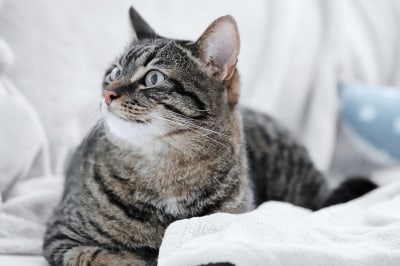Looking for a way to add some excitement to your cat's day? Why not try introducing them to catnip? This herb can turn even the most relaxed kitty into a playful and energetic one. Today, our Oklahoma City vets will discuss the effects of catnip on our feline friends and how to use it properly.
What is catnip?
Catnip, also called catmint, is a member of the mint family. This fragrant and resilient herb originated in Europe and Asia. However, it is now also widely grown in North America. Its heart-shaped leaves, small white or lavender flowers, and ability to thrive in low-water environments make it a popular choice in many gardens.
What does catnip do to cats?
When cats come into contact with catnip, they frequently have an interesting reaction. You may notice your feline companion sniffing, licking, rubbing, purring, rolling, or playing happily. Many pet owners are surprised to see their normally uninterested cat become fascinated with catnip.
The effects of catnip differ from cat to cat. Some cats become more playful, others relaxed and dreamy, and some show an increased interest in scratching and chewing.
Catnip's effects are usually only temporary, lasting about 15-30 minutes. After reacting to catnip, your cat may sit quietly and relax while the effects wear off. During this time, your cat becomes temporarily resistant to the herb's effects.
How does catnip work?
Catnip contains nepetalactone, a type of terpene found in the plant's stem and leaves. When cats smell nepetalactone, it activates brain chemicals related to mood and happiness. It is important to note that human brains do not respond to catnip in the same way that cat brains do, due to physiological differences.
Researchers believe that nepetalactone produces its mesmerizing effects by mimicking pheromones, which are chemicals essential for feline communication, particularly during mating rituals.
Do all cats respond to catnip?
While some cats react to catnip, others appear to be immune to the spell of nepetalactone. Researchers estimate that about 30% of our feline friends do not respond to catnip, possibly due to a genetically inherited trait passed down from parents.
The researchers also noted that kittens and senior cats are less likely to be affected by catnip than adult cats. This means that the response to catnip, which often includes behaviors like rolling, rubbing, and increased playfulness, may be less pronounced or even absent in kittens and senior cats.
Should you boost your cat's diet with catnip?
Catnip is less likely to influence a cat's eating behavior, but it should not serve as an appetite stimulant or depressant. Its mellowing effect can potentially reduce appetite in some cases. If you seek to modify your cat's appetite, consult your veterinarian for guidance.
Can catnip be dangerous for cats?
Catnip is thought to be a safe and non-addictive treat for our feline friends to enjoy. When they've had their fill, most cats will walk away. As a result, there is no recommended safe dosage for the herb.
There have been rare reports of cats overindulging in catnip. Mild stomach upset is the only known side effect. If your cat is exposed to catnip on a regular basis, it is likely that they will develop a tolerance to the herb's effects, gradually diminishing their response to it.
Catnip is safe for cats, but as with any treat or enrichment item, it should be used sparingly and under supervision, with veterinarians recommending using it once every few weeks.
Should I introduce catnip to my cat?
Many cats can safely enjoy the effects of catnip. Since the plant is non-toxic, it may be worth trying it with your cat to see how they respond. However, if you are unsure whether catnip is suitable for your feline family member, it's best to speak to your vet. They can provide guidance regarding catnip use.
Do people respond to catnip?
Although catnip can produce amusing effects on cats, it does not impact human emotions or well-being.
Note: The advice provided in this post is intended for informational purposes and does not constitute medical advice regarding people or pets. If you are concerned about your pet's health, contact your veterinarian immediately for diagnosis and treatment.



